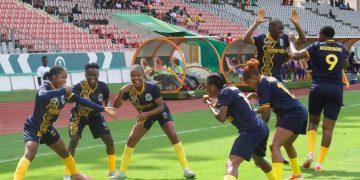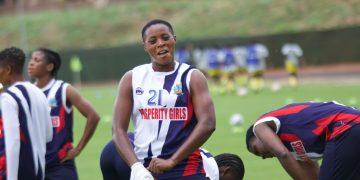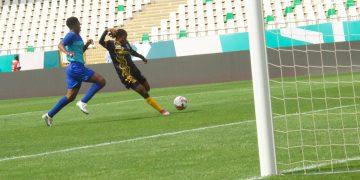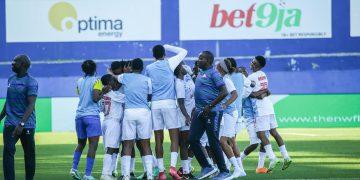Sarah Iludoba, an Anambra indigene, grew up playing football with her brothers on the streets of Lagos. The 28-year-old started her career as a midfielder, but she was converted to a centre-back by her coaches.
Football is the most popular sport in Nigeria, but it is not a career most Nigerian parents are willing to choose for their girl child.
Female football has grown in recent years, especially after the 2019 Women's World Cup, which attracted a combined 1.12 billion viewers, according to FIFA. Also, the UEFA Women's Champions League has gained popularity among fans in the last few years.
However, despite the progress of women football, the game is still underfunded in Nigeria, which is why many Nigerian parents kick against their girls playing football.
School is the number one priority for most parents as they want to see their girls become doctors, lawyers or Engineers.
It's worse for the girl child due to the stereotypes and discrimination they face as athletes in a male-dominated sport.
However, for Iloduba Sarah, she had the full support of her parents right from the moment she took an interest in the sport.
The Osun Babes Captain told Soccernet in a wide-range interview how football started for her and some of the challenges she faces as a female footballer in Nigeria.
When asked how she got involved in football, the 28-year-old said, “Like every other kid…on the streets in Lagos. I started playing at an early age with my brothers.”
But it was not until she finished secondary school that she decided to take the game seriously and go professional, thanks to her mum.
“Immediately I was getting out of secondary school, I decided to take it pro, and my mum was always in total support,” She said.
While her mum was in full support, Sarah's dad was sceptical at first because she felt her daughter could have taken another direction.
“He (My Dad) wasn't totally against it or voicing out his opinion, just thought I could have taken another route in life.”
The centre-back, however, joked that her dad was fully on board with her decision when she began sending money home.
While some girls are the butt of jokes for taking football seriously, Sarah never experienced such from her family or friends.
“Most of them were actually proud of me. Oh…'we have a footballer in the family ‘ that kind of thing.
Her first professional club was with Bayelsa feeders club before playing for a privately owned team. However, after leaving, she took a break due to the tragedy of losing her mom.
“My first professional club was Bayelsa Queen's feeders team. I left there, played for a few other small private owned clubs, got injured in between, lost my dear mum,.decided not to play football again….before I got here.
Sarah said, losing her mother (her support system) took a mental strain on her, and she had no choice but to take a break from football.
The Anambra indigene took a one year break, and during that period, she reached out to a higher power for strength and clarity.
“I was heartbroken. It (her mother's death) hit me really hard, was just going to church, trying to understand.” She wanted me to be the best, play abroad, and I wanted that too
The tragic situation hit her so hard, but Sarah revealed she had to make a comeback to make her family's dream come true.
Asked why she returned to football, the 28-year-old said: “Well..for the love of the game. I realised I had to make our dreams come true.”
Sarah currently captains Osun Stars in the Nigeria Women Football League (NWFL). The league was on a break for most parts last year, but the centre-back revealed they were paid despite the financial strain as a result of Covid-19.
Also Read: A Rare Sight Of A Family Fully Behind Their Girl Child Football Career
However, the 28-year-old insists there are still many challenges facing women footballers in Nigeria- one which is gender discrimination.
“I think first of all there's gender discrimination,” Sarah said. Female footballers are not taken as serious as their male counterparts in terms of almost everything.”
“I agree that it's a male-dominated sport, but the fact that females do it too should at least be enough to be given fair chances in all aspects.”
When asked to clarify, she said; Welfare package. The pay is far below. Except for teams like Edo Queens that is paying almost as much as the male team in the state, we have responsibilities too, some of us are actually breadwinners.
“And in Nigeria, in this sport, there is no pension. What you get now is what is yours. As female athletes, we cannot play as long as the men, we have our limits.”
Pressed on the average salary of an NWFL player, Sarah refused to answer. However, our sources gather that some of the players are paid as low as ₦30,000
The Osun stars also revealed her career has affected her relationships with distance a problem, while some men think sports don't allow women to get married or give birth.
“You know sometimes you are not in the same place as your partner, and for so long, it can cause a breakdown, Sarah said.”
“Some of them seem to think sport doesn't allow women to get married or be able to have children,” She added.
FIFA recently introduced a rule that guarantees female footballers to have maternity leave and also retain their job. But Sarah says clubs look at a player differently once she gives birth, but that doesn't happen to the men.
“About children, once a lady gets pregnant, they don't see her as someone that can play football anymore,” she said.
“But the male counterparts, some of them have families, they get married, they have children. But as a female player, it's hard for you to have a child and still continue playing. They just see you as you are done.”
“So that's another challenge we female footballers face. Because of that, we have to wait for too long before getting married, and it affects relationships.”
Nonetheless, Sara insists she would love to get married and have kids, while she would also love to play in England and the United States.
“I desire to play in the FA Women's Super League (WSL) or the league in the United States (The National Women's Soccer League).” I totally love the U.S women's national team.”
Talking about role models, Sarah cited the legendary Mia Hamm, Perpetual Nkwocha, Akudo Sabi and the late Ifeanyi Chiejine as her influences.





